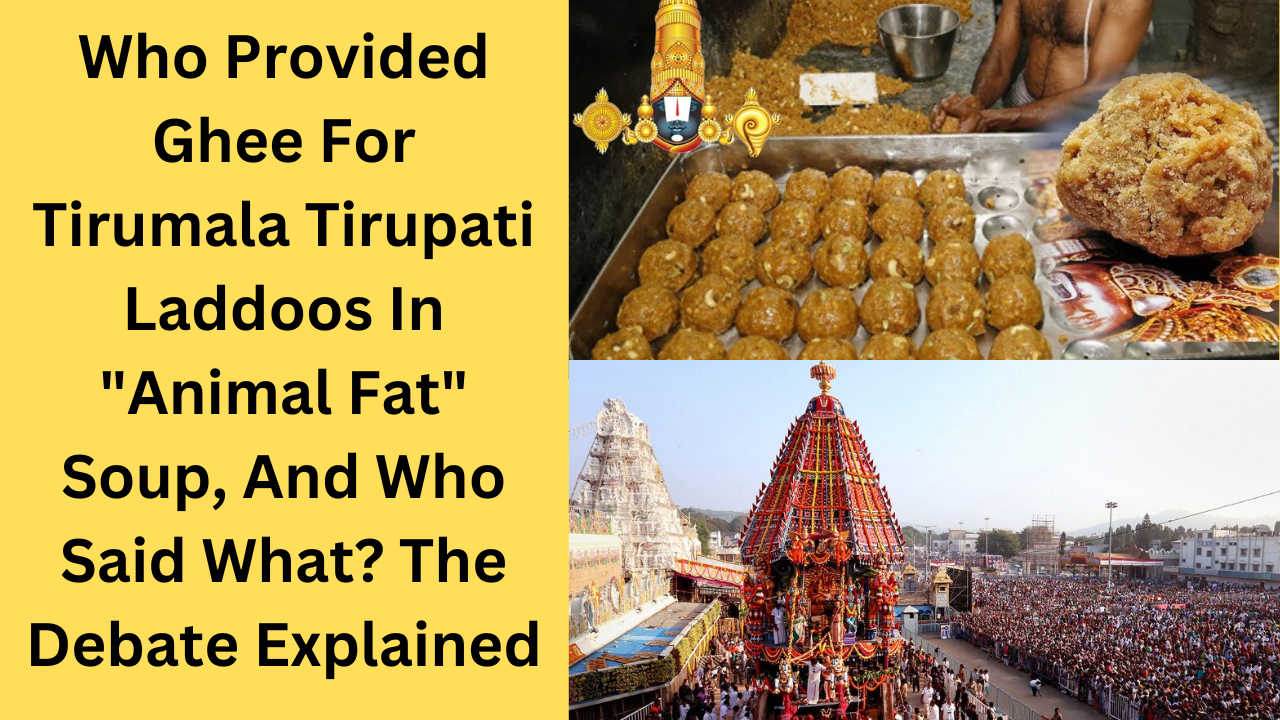Tirupati Laddoo: Who Provided Ghee For Tirumala Tirupati Laddoos In “Animal Fat” Soup, And Who

Tirupati Laddoo: The dispute around the making of Tirupati laddoos has escalated, with numerous religious and political figures voicing their opinions. On Wednesday, there was a huge uproar when Andhra Pradesh Chief Minister N Chandrababu Naidu asserted that Tirupati laddoos made in the previous administration, when YS Jagan Mohan Reddy was the state’s chief minister, included animal fat.
Tirupati Laddoo: IMPORTANCE OF THE PRECIOUS LADDOO
For over three centuries, the Tirupati Laddoo, also known as the “Srivari Laddoo,” has been the primary offering at the temple. Laddoo is thought to be Lord Venkateswara’s favorite naivedyam (a sacrifice made to God).
According to reports, the Tirupati Tirumala Devasthanam (TTD), which oversees the well-known Sri Venkateswara Swamy temple, uses cutting-edge packing procedures to ensure that their prasad laddoo stays fresh for 15 days.
A 2015 research study published in the World Wide Journals states that the laddoo sold at the Tirupati Temple is made with approximately one tonne of besan flour, ten tonnes of sugar, seven hundred kg of cashew nuts, one hundred and fifty kg of cardamom, three hundred and five hundred litres of ghee, five hundred kg of sugar candies, and five hundred kg of raisins per day.
Kalyanam Iyengar was the driving force behind the establishment of the “laddoo empire” in Tirupati, making laddoo a local delicacy. His son, brother, brother-in-law, and so on took up the mantle after him. It is also thought that amid the dreamy Tirumala hills, laddoos became a staple of the prasadam due to Iyengar’s culinary prowess.
The TTD employees made the laddoos personally up until 2001. Nevertheless, as the number of devotees grew over time, more laddoos needed to be made each day. A few years later, the temple administration established a “potu,” also called “The Lord’s Kitchen,” where firewood was used to prepare the prasad.
However, the quantity of laddoos produced fell short of the enthusiasts’ demand. So that 70,000 more laddoos could be made every day, another kitchen was installed.
Tirupati Laddoo: LADDOO TYPES AVAILABLE AT TIRUMALA
In Tirupati, three varieties of laddoos are typically made and served as prasad: Asthanam, Kalyanosthavam, and Proktham.
On exceptional festive occasions, asthanam laddoos are made and served to distinguished guests, some of whom may be prime ministers and presidents of India and other nations. Generally speaking, asthanam laddoos weigh about 750 grams apiece.
People who take part in the Arjitha Seva Grihastas (a weekly event that involves offering flowers and reciting the Samavedan) and Kalyanotsavam (special religious rituals performed on Lord Malayappa and his consorts amid the chanting of Vedic hymns) are given Kalyanotsavam laddoos.
Proktham laddoos, which are served to all pilgrims at the Tirumala Temple, are comparatively smaller. At 175 grams, the Proktham laddoo is fairly heavy.
Tirupati Laddoo: WHAT CHANDRABABU NAIDU SAID RELATING TO THE LADDOO CONTROVERSY
Chandrababu Naidu stated during an NDA legislative party conference that the previous government, led by YS Jagan Mohan Reddy, utilized animal fat and inferior ingredients to make laddoos, and did not even spare the Sri Venkateswara Swamy temple in Tirupati.
At a later press conference, TDP spokesperson Anam Venkata Ramana Reddy stated that the adulteration had been verified on ghee samples supplied by the Tirumala Tirupati Devasthanams by a livestock laboratory in Gujarat.
He held up the alleged lab report, which purportedly attested to the existence of “fish oil, lard, and beef tallow” in the provided ghee sample.
In response to the news, Chandrababu Naidu’s son and Andhra Pradesh IT Minister Nara Lokesh stated that the lab results unambiguously proved laddoos were made with beef fat, fish oil, and lard.
He emphasized that these developments were disclosed by Chief Minister Naidu on Wednesday, and he provided “evidence” to support them today.
Our holiest temple is the Lord Venkateswara Swamy temple in Tirumala. In an X post, Nara Lokesh said, “I am shocked to learn that the YS Jagan Mohan Reddy administration used animal fat instead of ghee in the Tirupati Prasadam.”
JP Nadda, the leader of the Bharatiya Janata Party (BJP), stated on Friday that he spoke with Chandrababu Naidu and asked him for facts.
“I asked for more information after speaking with the chief minister of Andhra Pradesh. I asked him to provide me the report, if it was available. In accordance with the Food Safety and Standards Authority of India (FSSAI), appropriate action would be taken; we will also confer with the state regulator,” Nadda stated.
WHAT IS THE STATUS OF THE LAB REPORT?
Anam Venkata Ramana Reddy’s lab result indicated that the ghee samples included beef tallow. Additionally, it stated that the samples contained fish oil and lard, which is related to swine fat.
The lab report was dated July 16, 2024, while the sample was received on July 9, 2024.
“The lab reports of samples certify that beef tallow and animal fat – lard and fish oil were used in the preparation of ghee which was supplied to Tirumala and also the S value is only 19.7,” Reddy stated during the press conference.
Reddy further added, “Chandrababu Naidu had stated yesterday that animal fat was used as one of the ingredients for the preparation of ghee which was supplied to Tirumala Tirupati Devasthanam,” in an interview with the news agency ANI. The National Dairy Development Board in Gujarat received lab reports from samples that were tested, and they attest to the use of beef tallow, animal fat (lard), and fish oil in the production of the ghee that Tirumala received. Additionally, the S value of the samples is only 19.7.
This is disrespectful to the faith of Hinduism. This ghee has been combined with the prasadam, which is offered to the Lord three times a day. Reddy stated, “We pray that justice will be served and that Lord God would pardon us for any errors we may have made.
The National Dairy Development Board (NDDB) in Anand, Gujarat, operates the multidisciplinary CALF (Centre for Analysis and Learning in Livestock & Food) laboratory.
In the meantime, neither the TTD nor the Andhra Pradesh government could officially confirm the lab report.
THE YSRCP’S REBUTTAL
YV Subba Reddy, a senior YSRCP leader and Rajya Sabha member who presided over the Tirumala Tirupati Devasthanams for four years, said that Naidu’s accusations had damaged the devotees’ feelings and called into question the deity’s sacred status.
It is inconceivable to even suggest that the laddoos distributed to devotees and the sanctified meal offered to the deity included animal fat. Reddy claimed in a statement that “there is no other heinous attempt than to claim that animal fat was being used.”
Reddy urged Naidu to come and swear before the god, Sri Venkateswara Swamy, asserting that he is a Hindu who worships the god regardless of the veracity of his accusations.
He added that he would take legal action and file a Supreme Court petition if Naidu failed to provide evidence to support his claims.
B Karunakar Reddy, a former TTD chairman and senior YSRCP leader, claimed that Naidu concocted sacrificial accusations regarding Tirupati laddoos in order to gain political points.
Karunakar Reddy, the former chairman of TTD thrice, claimed that Naidu was deliberately attacking Jagan Mohan Reddy and the opposition party with his allegations that Tirupati laddoos, a sacred delicacy, were laced with animal fat under the YSRCP rule.
“He (Naidu) fabricated abhorrent claims that animal fat was utilized in the preparation of Swamy’s (the god) laddoos in an attempt to disparage YSRCP, YS Jagan Mohan Reddy, and the previous government (YSRCP). “It’s an appalling experiment,” Reddy said on a local news station.
PARTIES REQUEST A DETAILED INVESTIGATION
President of the AP Congress Committee (APCC), YS Sharmila, attacked the opposition YSRCP and the ruling TDP on Thursday for allegedly engaging in “heinous” politics over Tirupati laddoos. She also urged for a CBI investigation to determine whether animal fat was used to create the sweet.
In addition, the Andhra Pradesh unit of the BJP stated in an X post that all Hindus were distressed by Naidu’s comments over the laddoo controversy. The party argued that an immediate investigation into Naidu’s claims was necessary.
Hindus who pray to Lord Venkateswara, according to Union Minister Bandi Sanjay Kumar, had their confidence and trust deeply betrayed by the rumored usage of animal fat in the laddoos.
In a post on X, he insisted that the Andhra Pradesh government look into the situation right away in order to find out the truth and punish those who are at fault.
The hallowed laddoo prasadam was allegedly made using “beef fat and fish oil” during the former YSR Congress government, according to Telangana BJP MLA Raja Singh. This is a blatant attack on our rich cultural and religious history, which cannot and can not be tolerated.
He implored Union Home Minister Amit Shah, Chandrababu Naidu, and Prime Minister Narendra Modi to act swiftly to apprehend those accountable for the “severe offense.”
WHAT IS THE GHEE’S ORIGINATING PLACE?
According to reports, the TTD board buys ghee through an electronic tender that is launched every six months. An estimated 5 lakh kilograms of ghee, or around 42,000 kilograms per month, are purchased by the board annually.
Karnataka Milk Federation (KMF), the company that produces milk under the Nandini brand, has explained that they no longer provide ghee to the TTD as the controversy has grown. They claim that the decision was made four years ago due to concerns about pricing.
Additional reports imply that the KMF was unable to provide ghee at TTD-acceptable prices. This happened following a Rs 3 increase in milk prices by the Karnataka government.
WAS LOW-QUALITY MILK PROCURED BY TIRUPATI?
KMF chairman Bheema Naik claimed in August 2023 that the temple organization was obtaining ghee of inferior quality. In response to Naik’s allegations, AV Dharma Reddy, the TTD executive officer at the time, stated that the temple body only purchases cow ghee from vendors who successfully complete the rigorous e-tender procedure and pass the twin tests of uncompromising quality and least cost (L1 bidder).
Furthermore, he added that KMF, who was never qualified as an L1 bidder, had only delivered ghee once in the previous 20 years, and that this had included an instance of late delivery of the consignment.

